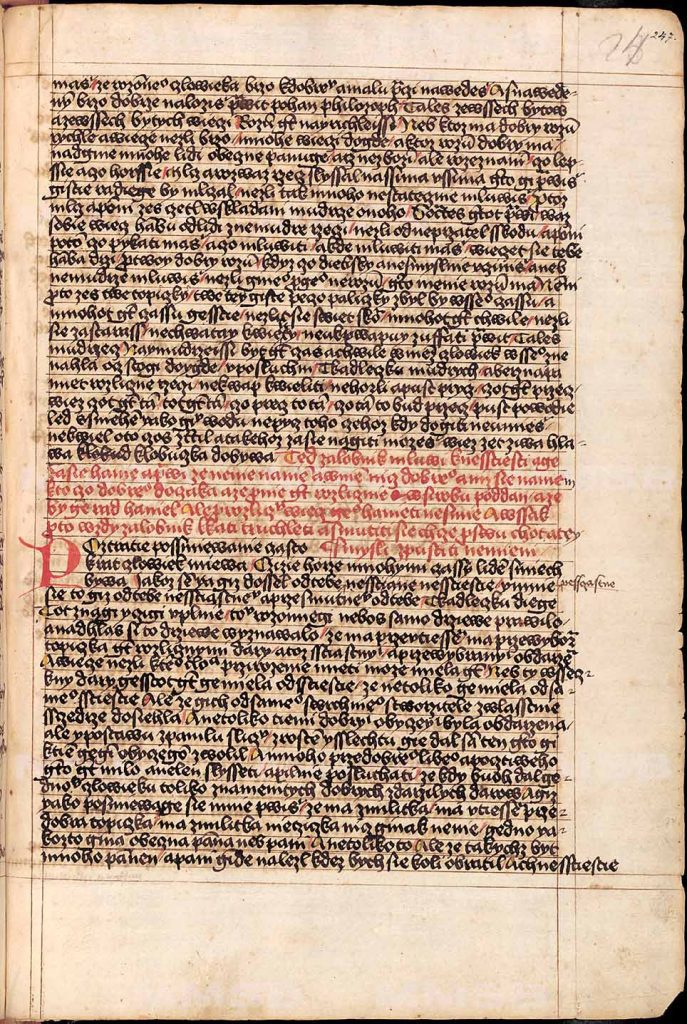| Author | unknown |
| Genre | prose |
| Keywords | 15th century, dispute, entertaining literature, Old Czech |
| Title (in Czech) | Tkadleček |
| Title (in English translation) | The Weaver |
| Editor | Andrea Svobodová – Kateřina Voleková |
| Translator | Walter Schamschula |
| Edited sources | Praha, Strahovská knihovna, sign. DG III 7, ff. 247r-249r, 258v-260v; Manuscript, Praha, Strahovská knihovna, sign. DG IV 68, ff. 80r-82v |
| Introduction | Walter Schamschula – Andrea Svobodová |
| TEI P5 XML Encoding | Katarína Džunková – Michal Mocňák – Ondřej Tichý |
| Summary of content | A prosaic dispute between a prosecutor, Tkadleček, a representative of the emotional component of man, and Misfortune, a representative of the reason, on the question of whether man is free to determine his own destiny and to what extent he is limited by the will of God. |
Introduction to the Text
The dialogue, which features a dispute between a prosecutor, Tkadleček (or rather Tkadlec, ‘Weaver’), and the personification of Misfortune, originated shortly after 1407. In a dispute that uses a wide range of rhetorical devices, the weaver accuses Misfortune of having taken away from him his sweetheart, who left him for a rival. Misfortune replies to these accusations with extensive quotations from learned books, the philosophical and theological knowledge of his time. In contrast to most medieval disputes which end in a sentence by a judge, there is no final statement after the 16 responses of the dialogue; but the fact that Misfortune’s last speech remains unanswered seems to prove that it represents the accepted conclusions of the author. Misfortune understands himself to be a tool of divine Providence. The name Tkadlec is a symbol: tkadlec/weaver (textor) means the writer (the anonymous author may well have been a professional scribe).
The weaver symbol occurs in an early Middle High German prose dispute often associated with Tkadleček: Der Ackermann aus Böhmen (‘The Plowman from Bohemia’, ascribed to Johannes von Saaz/Žatec, perhaps before 1400). Although in this piece the imagery relates to agriculture, there are striking parallels between Tkadleček and Ackermann which tempt us to believe that there is a genetic relationship between the texts. This relationship has been seen in many ways in the past, beginning with the assumption of Tkadleček influencing Ackermann, Ackermann influencing Tkadleček, or even the assumption of a common author. The fact that Tkadleček contains references to plowman imagery not found in Ackermann itself seems, however, to indicate that Tkadleček refers to a text of Ackermann far more verbose than the text that has come to us. Tkadleček has therefore been an important tool for the reconstruction of the original Ackermann text which may have been condensed by a later author (cf. Schamschula 1982). Although Ackermann is more impressive in its profoundness of emotions, Tkadleček gives a better general idea of the medieval way of reasoning and arguing, making it a scholarly dispute rather than a dramatic confrontation. In this dialogue, Misfortune is well-equipped with scholarly knowledge, whereas Tkadleček responds to him in a more emotional way.
Introduction to the Sources
Tkadleček has been preserved in two copies, the first from the half of the 15th century (Praha, Strahovská knihovna, DG III 7, ff. 224r-268v; available online), and the second copy from the second half of the 15th century (Praha, Strahovská knihovna, DG IV 68, ff. 2r-117r; available online).
About this Edition
The edition brings together two excerpts: chapter 11 and part of chapter 14 (the final part is missing). The given transcription was made according to the manuscript DG III 7, and part (the missing folio) of the text of chapter 14 according to the ms. DG IV 68, taking into account the edition of Walter Schamschula (cf. Schamschula 1991, see Existing editions below).
The present translation has been taken, with the permission of Walter Schamschula, from the text of his edition (cf. Schamschula 1991, see Existing editions below) while only few textual changes have been made to the text (as recorded in the footnotes). The introductory information, based on Schamschula´s edition, has been supplemented from new contributions on the topic.
Existing Editions
Starobylá skládanie. Tkadleček: Památka XIV. wěku, Václav Hanka (ed.), Praha 1824 [source unspecified; standardized transcription].
Tkadleček, Hynek Hrubý – František Šimek (eds.), Praha 1923 [ms. DG III 7, supplemented by ms. DG IV 68; semi-diplomatic transcription].
Tkadleček. Hádka milence s Neštěstím, které ho připravilo o jeho milenku, František Šimek (ed.), Praha 1940 (second edition: Tkadleček. Hádka milence s Neštěstím, Ludmila Kubíková – Karel Stejskal – František Šimek, Praha 1974) [ms. DG IV 68; standardized transcription].
Tkadleček, in: Próza z doby Karla IV., Jan Vilikovský (ed.), Praha 1948, pp. 219-240 [ms. DG IV 68; standardized transcription].
Tkadleček, in: Výbor z české literatury od počátků po dobu Husovu, Bohuslav Havránek a kol. (eds.), Praha 1957, pp. 568-579 [excerpts from ms. DG III 7; standardized transcription].
Tkadleček/The Weaver, in: An Anthology of Czech Literature. 1st Period: from the Beginnings until 1410, Walter Schamschula (ed.), Frankfurt am Main – Bern – New York – Paris 1991, pp. 185-215 [excerpts from ms. DG III 7, DG IV 68; standardized transcription].
[Tkadleček], Pavlína Kuderová (ed.), Praha 2012 [ms. DG IV 68; standardized transcription]. Available at: https://vokabular.ujc.cas.cz/edice/TkadlB
Existing translations
Tkadleček/The Weaver, in: An Anthology of Czech Literature. 1st Period: from the Beginnings until 1410, Walter Schamschula (ed.), Frankfurt am Main – Bern – New York – Paris 1991, pp. 185-215 [ms. DG III 7, DG IV 68].
Further Reading
Schamschula, Walter: Der ‘Ackermann von Böhmen’ und ‘Tkadleček’. Ihr Verhältnis in neuer Sicht, Bohemia 23, Munich 1982, pp. 307-317.
Lehár, Jan: Tkadleček, in: Lexikon české literatury 4/I (S–T), Praha 2008, pp. 936-938 [encyclopedic entry listing editions and literature up to 2008]. Available at: https://service.ucl.cas.cz/edicee/lexikon/lexikon/248-lexikon-ceske-literatury-osobnosti-dila-instituce-4-i-s-t
